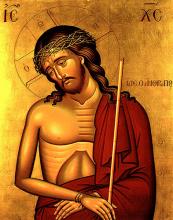
On the days following His entry to Jerusalem, Christ spoke to His disciples in particular abaout the signs that will precede the Last Day (Matt. 24 and 25); and so this forms the theme of the first part of Holy Week. In Western worship, on the other hand, the 'last things' are commemorated mostly during the pre-Christmas season of Advent. The eschatalogical challenge of the first thee days of Holy Week is summed up in the troparion and exapostalarion at Matins, both of which are repeated three times to a slow and solemn melody. The troparion, 'Behold the Bridegroom come at midnight...', is based on the parable of the Ten Virgins (Matt. 25:1-13); the exapostalarion, 'I see Thy bridal chamber...', on the parable of the man cast out from the feast because he had no wedding garment (Matt. 22:11-13). Here, presented in especially urgent terms, is the call that we have heard on many occasions during Lent: the End is near at hand; be watchful; repent while there is still time.
Each of the three days has its own particular theme. (Ed. note: Matins is held the evening before, so the Matins for Great and Holy Monday are served on Sunday afternoon/evening, Matins for Tuesday are served Monday night, etc.)
Holy Wednesday
On Wednesday we commemorate the woman that was a sinner, who annointed Christ's feet as He sat in the house of Simon. In the hymnography of the day, the account in Matthew 26:6-13 is combined with that in Luke 7:36-50 (and also John 12:1-8). A second theme is the agreement made by Judas with the Jewish authorities: the repentance of the sinful harlot is contrasted with the tragic fall of the chosen disciple. The Triodion makes it clear that Judas perished, not simply because he betrayed his Master, but because, having fallen into the sin of betrayal, he then refused to believe in the possibility of forgiveness: 'In misery he lost his life, preferring a noose rather than repentance'. If we deplore the actions of Judas, we do so not with vindictive self-righteousness but conscious always of our own guilt: 'Deliver our souls, O Lord, from the condemnation that was his.' In general, all the passages in the Triodion that seem to be directed against the Jews should be understoond in this same way. When the Triodion denounces those who have rejected Christ and delivered Him to death, we recognize that these words apply not only to others, but to ourselves: for have we not betrayed the Savior many times in our hearts and crucified Him afresh?
- From The Lenten Triodion, "The Meaning of the Great Fast", Metropolitan Kallistos (Ware)
